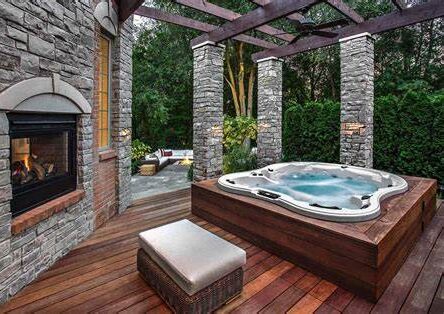Adding a hot tub or spa to your home can elevate your backyard experience, providing relaxation and luxury. However, these amenities can also increase your home insurance requirements. Homes with hot tubs or spas carry unique risks that may affect your insurance policy, from liability coverage for guests using the tub to structural coverage for the spa itself. This guide provides an overview of home insurance for hot tubs and spas, explaining the factors that influence your policy and tips for securing comprehensive coverage.
Table of Contents
ToggleWhy Insuring a Home with a Hot Tub or Spa is Important
A hot tub or spa can be a fantastic addition to your home, but it also brings certain risks that can affect your homeowners insurance policy. Hot tubs, spas, and similar water amenities increase the potential for accidents, including slips, falls, and even drowning. Additionally, these fixtures can be susceptible to damage from weather, freezing temperatures, or structural issues. Home insurance can protect you financially if an accident or damage occurs involving your hot tub or spa, offering peace of mind and financial security.
If you have a hot tub, it’s essential to inform your insurer. Failing to disclose a spa or hot tub on your property may void part of your coverage if an accident occurs, leaving you responsible for any liability costs or repairs.
How a Hot Tub or Spa Affects Home Insurance
When you add a hot tub or spa to your property, your insurance provider will evaluate the potential risks and may adjust your homeowners insurance policy to include:
- Increased Liability Coverage: If a guest is injured while using your hot tub, you could be liable for medical costs and potential legal fees. Many insurance providers require a liability add-on or an increase in liability limits for homes with hot tubs or spas.
- Increased Property Coverage: Your hot tub or spa is considered part of your home’s property value. Adding this fixture may increase your property coverage limit, affecting your monthly premium.
- Requirements for Safety Precautions: Insurers may ask you to install safety features, such as covers or fences, to reduce the risk of accidents and limit liability.
Key Coverage Types to Consider
Understanding the types of coverage you need for your hot tub or spa is essential to ensure complete protection. Here are the three main types of coverage homeowners should consider:
Liability Insurance
Liability insurance covers injuries that occur on your property. Since hot tubs and spas are considered “attractive nuisances,” meaning they can attract guests (or trespassers) and lead to accidents, homeowners with these amenities should consider higher liability limits.
- Personal Liability: Typically included in standard home insurance, this protects you if someone is injured while using your hot tub. Increasing your liability limit to at least $300,000 is recommended, as hot tubs carry a higher accident risk.
- Umbrella Policy: An umbrella policy offers additional liability coverage beyond your standard home insurance, providing extra protection if a major accident or lawsuit occurs. This can be particularly useful if you frequently entertain guests or rent out your property.
Property Damage Coverage
Property damage coverage protects your home, including the hot tub or spa structure itself. This may cover repair or replacement costs if the hot tub is damaged due to covered perils, such as fire, wind, or vandalism.
- Replacement Cost Coverage: Replacement cost coverage pays to repair or replace your hot tub without factoring in depreciation. This ensures you’ll receive enough to replace your hot tub at today’s market value.
- Weather-Related Coverage: If you live in an area prone to freezing temperatures, you may need additional coverage for freeze-related damage, as some policies exclude damage caused by freezing or poor maintenance.
Additional Coverage Options
Some hot tub owners may choose additional optional coverage to enhance their protection:
- Mechanical Breakdown Coverage: Covers repairs to the hot tub’s mechanical components, such as the pump or heater, which are typically excluded from standard policies.
- Flood Insurance: If your hot tub is located in an area at risk of flooding, a separate flood insurance policy may be necessary, as flood damage is often not covered by standard homeowners insurance.
How to Lower Insurance Costs for Homes with Hot Tubs or Spas
Owning a hot tub doesn’t necessarily mean you’ll face steep insurance premiums. Here are a few strategies to potentially lower insurance costs while ensuring comprehensive coverage:
- Install Safety Features: Adding safety features like a locking cover, non-slip surfaces, a fence with a self-locking gate, and an alarm system can help prevent accidents and reduce liability risk. Some insurers offer discounts for these safety measures.
- Maintain the Hot Tub Properly: Routine maintenance, such as regularly inspecting the tub and checking for leaks, cracks, or wear, can help prevent damage. Ensuring that the hot tub is properly winterized if you live in a cold climate can also avoid costly freeze damage.
- Increase Your Deductible: If you’re comfortable with a higher out-of-pocket expense for small claims, increasing your deductible can lower your premium. Just make sure you have funds set aside for the deductible amount in case of a claim.
- Bundle Insurance Policies: Many insurers offer discounts if you bundle home insurance with other policies, such as auto or life insurance. Check with your provider to see if bundling can save on your monthly premium.
- Shop Around for Insurance: Rates for homes with hot tubs can vary by provider. Getting quotes from several companies can help you find the best coverage for your needs at a competitive rate.
Tips for Maintaining Hot Tub Safety
To minimize the risk of accidents and liability concerns, implement these hot tub safety tips:
- Always Supervise: Never allow children or inexperienced swimmers to use the hot tub unsupervised.
- Monitor Water Quality: Poor water quality can cause skin irritations or infections. Regularly check and balance the water’s pH and chlorine levels.
- Post Clear Safety Guidelines: Ensure that guests are aware of safety rules, such as avoiding alcohol consumption, using non-slip surfaces, and observing time limits for hot tub sessions.
- Regularly Inspect for Issues: Check the tub’s mechanical components, electrical connections, and structural integrity. Address any potential hazards or signs of wear and tear immediately.
- Lock the Cover: When the hot tub is not in use, keep the cover securely locked to prevent children or pets from accidentally falling in.
Common Questions About Hot Tub Insurance
Do I need separate insurance for my hot tub or spa?
Most homeowners insurance policies provide some coverage for hot tubs, but the level of protection may vary. Consult with your insurer to confirm if your hot tub is included and if additional liability or property coverage is necessary.
Will my insurance cover damage caused by freezing?
Many standard home insurance policies exclude coverage for freeze-related damage if the hot tub wasn’t properly winterized. To avoid this issue, winterize your hot tub if you live in a region with freezing temperatures and discuss possible coverage options with your provider.
Can I be sued if someone is injured in my hot tub?
Yes, if someone is injured while using your hot tub, you could be liable for medical expenses and possibly face legal action. Increasing your personal liability coverage or adding an umbrella policy can provide additional financial protection in such situations.
How much does it cost to insure a home with a hot tub?
The cost to insure a home with a hot tub varies based on factors such as the tub’s size, location, and your policy’s coverage limits. Adding a hot tub could raise your premium slightly, especially if you increase liability limits or add optional coverage.
Will my homeowners insurance cover a hot tub used for rental purposes?
If your property with a hot tub is rented out, standard home insurance may not cover injuries or damages. Consider purchasing a landlord or short-term rental policy for liability protection if you rent out your property frequently.
Conclusion
Insuring a home with a hot tub or spa requires careful consideration to ensure that you have adequate liability and property damage coverage. By increasing liability limits, installing safety features, and performing regular maintenance, you can create a safe and enjoyable space for family and guests while protecting yourself from potential financial risks. If you have specific questions or concerns, consult with your insurance provider to customize a policy that fits your needs. For more detailed guidance on home insurance with pools, spas, or hot tubs, visit Insurance Information Institute’s Guide on Pools and Home Insurance.
Investing in the right insurance will allow you to enjoy your hot tub or spa with peace of mind, knowing that your home and guests are protected.




